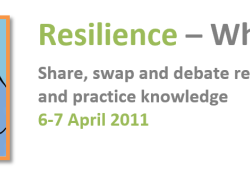Topic: Opportunities for building resilience in practice: Student-practitioners’ perspectives – Beccy Howie, Health Visitor student, and Caroline Hudson, Practice Teacher Module Leader/Senior Lecturer, University of Brighton
Resources: You can download the slides.
Session summary: This session aims to explore student-practitioners’ perspectives on factors that promote their resilience in practice. Nurses report higher levels (42%) of ‘burnout’ than their European counterparts (Aiken et al 2012). Recommendations for tackling work related stress in the caring professions with benefits to service users, staff and organisations have been reported by Boorman (2009). Promoting resilience in students and practitioners is the focus of this seminar, based on recent work by Kinman and Grant (2011), which reports that resilience mitigates against work related stress.
The authors will present a resilience map based on literature findings, which reveals risk and protective factors in the work / learning context. The Resilience map draws on Hart and Blincow’s Resilient Therapy Framework (2007), to categorise the themes identified from students and supervisory practitioners, and offers an application to building resilience in ‘mentoring’ relationships in other health care professions.
Learners have an ‘acute need for positive mentoring’ (Skovholt and Trotter Mathison, 2011 p 87) and the quality of mentoring in early clinical experience can be a ‘make or break’ issue (Andrew et al. 2009 p17). SCPHN students enter the practice arena under the guidance and supervision of an experienced practitioner, known as a Practice Teacher (NMC 2008). The learner spends fifty per cent of their time in practice with the Practice Teacher, who is accountable for signing them off to enter onto a professional register (NMC 2008).
Promoting resilience within, and through this critical relationship may reduce levels of work related stress. This seminar provides some insights into the student:supervisor relationship through the presenters unique perspectives. The presenters will demonstrate their personal responses to practice situations, using emotional and social competencies (Grant and Kinman 2011). These underlying competencies have been shown to be protective, and could help to sustain learners’ and experienced practitioners’ in the challenging context of practice.
Caroline is the Practice Teacher Module leader, and will be joined by student practice teachers to explore their unique perspectives on developing resilient moves in practice. Beccy is one of the new influxes of Health Visiting students attracted to change practice direction in response to the ‘call to action’ of the Health Visitor implementation plan (DH 2011). She took the opportunity to explore workforce resilience as her ‘work based learning project’ (part of the Specialist Community Public Health Nursing degree).
Biography: Caroline Hudson has an MSc in Professional Health Care Education and is currently the Practice Teacher Module Leader at the University of Brighton. Caroline has provided educational programmes for mentors over the last seven years and has developed a resilience toolkit for mentors to use in practice. Caroline has a nursing background and is currently offering Resilience workshops to nurses and allied health professions in the Trusts. Beccy Howie is currently completing the Specialist Community Public Health Nursing degree (Health Visitor pathway), her background is nursing and counselling, for the last 20 years she has worked therapeutically in a variety of settings with children and families in need, including for The Children’s Society, social care and CAMHS.
Most Interested: Practitioners, students, researchers, academics and parents.
References:
- Aiken, L.H., et al. (2012). Patient safety, satisfaction, and quality of hospital care: cross sectional surveys of nurses and patients in 12 countries in Europe and the United States.British Medical Journal, 344, e1717. doi:10.1136/bmj.e1717
- Andrew, N., McGuinness, C., Reid, G., & Corcoran, T. (2009). Greater than the sum of its parts: transition into the first year of undergraduate nursing. Nurse Education in Practice, 9, 13-21.
Boorman, S. (2009). NHS health and well-being. Leeds: Department of Health. Retrieved from http://nhshealthandwellbeing.org - Department of Health (2011). Health Visitor Implementation Plan 2011-2015:A Call to Action. London: Department of Health
- Grant, L., & Kinman, G. (2011). Enhancing wellbeing in social work students: Building resilience in the next generation. Social Work Education, 1-17. doi:10.1080/02615479.2011.590931
- Hart, A., Blincow, D., with Thomas, H. (2007). Resilient Therapy with children and families. London: Brunner Routledge (see chapters 2 and 8)
- Kinman, G., & Grant, L. (2011). Exploring stress resilience in trainee social workers: The role of emotional competencies. British Journal of Social Work, 41(2), 261-275. doi:10.1093/bjsw/bcq088
- Nursing and Midwifery Council (2008). Standards to support learning and assessment in practice (2nd ed.). London: Nursing and Midwifery Council.
- Skovholt, T.M., & Trotter-Mathison, M. (2011). The resilient practitioner: Burnout prevention and self-care strategies for Counsellors, Therapists, Teachers and Health Professionals (2nd ed.). London: Routledge.
This session took place on Wednesday 11 July 2012.
The Resilience Forum is for ANYBODY (with a pulse!) involved with or interested in resilience research!


